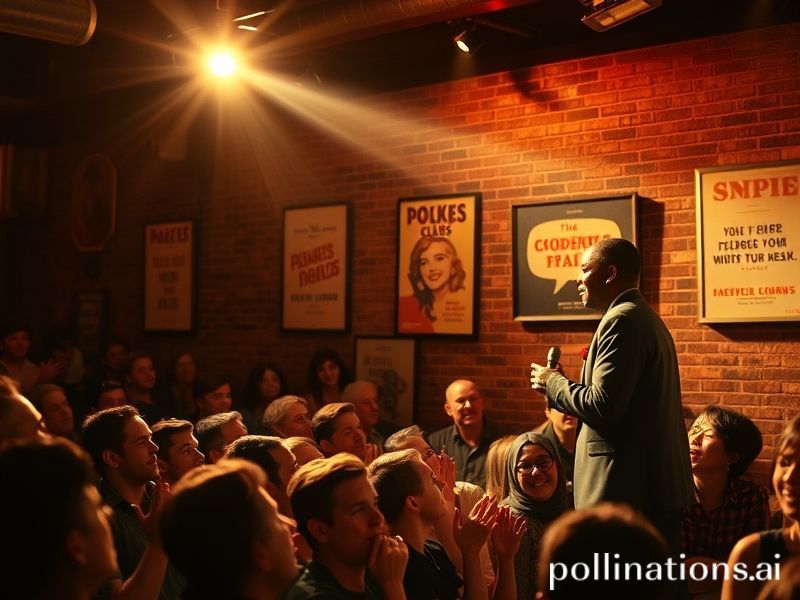jokes
The Global Joke Index: How One-Liners Are Quietly Steering Geopolitics
By Our Correspondent in Perpetual Transit
VIENNA—While the rest of the press corps was busy dissecting grainy satellite photos of missile silos last week, the Organization for Security and Co-operation in Europe quietly released a more explosive document: the first-ever Global Joke Index (GJI). The 42-page report ranks 193 UN-recognized states on the potency, virality, and diplomatic fallout of their national humor exports. Iceland, population 370,000 and approximately four sheep, came in first—proof that if you can’t project hard power, you can still weaponize gallows humor about volcanic bankruptcy.
The implications, as always, are larger than the setup. Jokes have become the soft-power equivalent of crypto: borderless, untraceable, and capable of crashing regimes that forgot to update their cultural firmware. When a single Chinese meme comparing Xi Jinping to Winnie-the-Pooh can trigger a nationwide ban on honey, you realize satire now moves markets faster than a hedge fund on amphetamines.
Consider the recent fracas between South Korea and Japan over a TikTok clip in which a K-pop idol squints at a plate of sushi and deadpans, “Raw? I thought we already settled this in 1945.” Within hours, #SushiReparations was trending worldwide, the won dipped 0.6 percent, and three Japanese lawmakers demanded the extradition of everyone who ever used the laughing-crying emoji. Seoul responded by dispatching not diplomats but a squad of professional clowns—literal ones, with red noses and union cards—on a “goodwill tour” of Tokyo. The clowns’ press conference ended in a custard-pie melee that Bloomberg described as “a better return on slapstick investment than any 10-year JGB.”
Meanwhile, the European Union—ever eager to regulate the air we breathe—has drafted Directive 2024/LOL, which would require all jokes crossing Schengen borders to carry a QR code linking to a trigger-warning database. French negotiators insisted on an exception for existentialist punchlines, because, as one exhausted diplomat sighed, “If Sartre can’t be bleak in Brussels, where can he be?” The Italians threatened veto unless Parmesan was classified as a protected comedic device. The Germans simply asked for more footnotes.
The United States, true to form, has privatized the problem. Silicon Valley start-up LaughCoin™ is beta-testing a blockchain that timestamps every pun, ensuring royalties accrue to the original wit—or at least to whichever bot farm filed the NFT first. Early investors include three sovereign wealth funds and the Saudi crown prince, who, according to a leaked pitch deck, wants to “own the supply chain of sarcasm.” If you think that sounds dystopian, remember: he who controls the memes, controls the means of ridicule.
Of course, not everyone is laughing. The Global South faces what development economists call the “humor deficit”: limited bandwidth to export jokes when you’re still importing cholera vaccines. Kenya’s entry in this year’s GJI—a self-deprecating skit about Chinese debt traps set to a Afro-fusion beat—was widely praised until Nairobi discovered Beijing had quietly purchased the copyright. The skit now airs as an infomercial on CCTV-4, sandwiched between ads for affordable bulldozers and “win-win” friendship bracelets.
And yet, the joke persists, cockroach-like, scuttling across borders where journalists and diplomats fear to tread. In Tehran, a banned meme of Ayatollah Khamenei riding a Peloton bike sparked the regime’s first-ever Ministry of Cardio-Security. In Moscow, a Telegram channel that rates Vladimir Putin’s shirtless selfies on a scale from “bear wrestler” to “dermatology cautionary tale” boasts more subscribers than the combined circulation of Pravda and the Moscow Times—though all of them use pseudonyms ending in 1234 for plausible deniability.
What does it all mean? Simply this: when traditional levers of influence—trade, aid, tanks—start to feel rusty, a well-timed punch line can still slip past customs. The world order isn’t just multipolar; it’s multi-punchline. And whoever writes the last joke may not win, but they’ll definitely get the final retweet.
So keep your passports stamped and your VPNs updated. The next geopolitical crisis won’t be announced by a red phone ringing at 3 a.m.; it’ll drop as a 12-second video with captions and a laughing goose soundtrack. History doesn’t repeat itself, it reposts—usually without credit.







